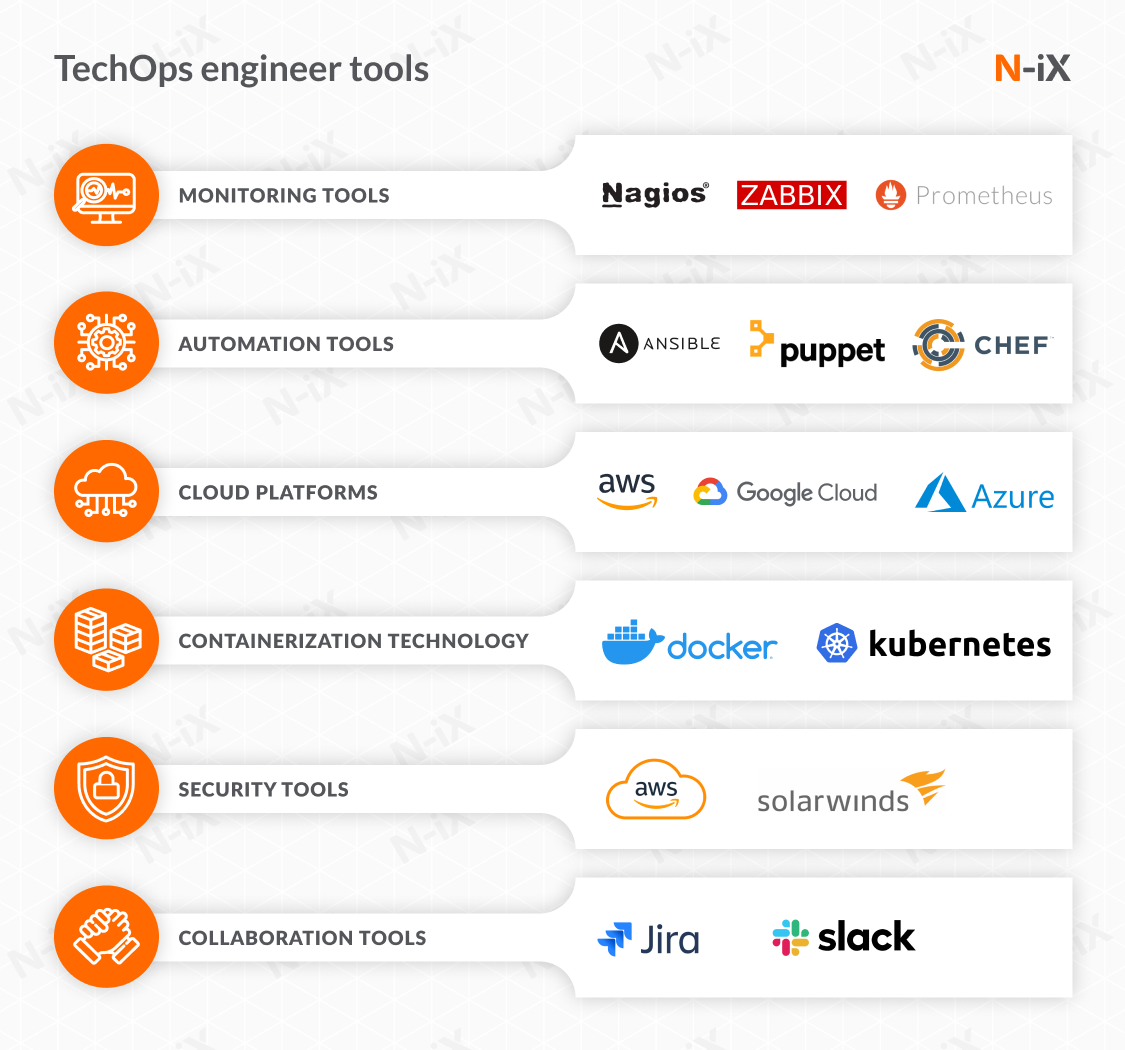Businesses rely heavily on their technology infrastructure to operate efficiently and effectively. As technology evolves rapidly, organizations need a dedicated team to manage and maintain their technology infrastructure. This is where Technology Operations (TechOps) comes in. TechOps is a relatively new discipline that manages and maintains an organization's technology infrastructure.
Let’s explore what TechOps is and what the job responsibilities for this position are. This article will also compare TechOps vs. DevOps to define the differences and similarities between the two.
TechOps vs. DevOps: Definitions
TechOps is an IT operations branch focusing on managing technology infrastructure and systems. TechOps teams are responsible for deploying, maintaining, and troubleshooting servers, networks, databases, and storage systems. They ensure that systems are secure, scalable, and available to support the organization's operations.
Development Operations (DevOps) refers to practices that improve collaboration and communication between development and operations teams. DevOps teams automate software development, from building and testing to deployment and monitoring. They work to ensure that software is delivered quickly, reliably, and with high quality.
While TechOps and DevOps share some similarities, they are distinct disciplines. TechOps manages infrastructure and systems, while DevOps focuses on developing and deploying software. TechOps teams typically work closely with DevOps teams to ensure the infrastructure and systems supporting software development and deployment run smoothly.
We have talked about DevOps specialists many times before, so you can check our previous post DevOps infrastructure engineers. In this article, we want to walk you though responsibilities and toolset of techops, as well as how these two positions can compliment each other.
TechOps job responsibilities
The job responsibilities of TechOps professionals can vary depending on the organization but typically include:
- Infrastructure management. TechOps specialists manage the organization's technology infrastructure, including the hardware, software, and networking components. Infrastructure management comprises selecting, installing, configuring, and maintaining the servers, storage systems, databases, and other infrastructure components to ensure they function optimally. TechOps professionals work with vendors and other team members to ensure the infrastructure aligns with business needs and goals.
- Systems monitoring. TechOps specialists continuously monitor the organization's systems to ensure they run smoothly and detect potential problems. Systems monitoring is responsible for collecting data on system performance, setting up alerts to notify them of any issues, and analyzing system logs to identify the root cause of problems. They also perform routine health checks to ensure that systems are healthy and functioning as expected.
- Disaster recovery. Technology Operations specialists develop and maintain disaster recovery plans to ensure systems can be quickly restored during an outage or disaster. It includes implementing backup and recovery processes for critical systems and testing recovery procedures regularly to ensure they are effective. TechOps professionals work closely with other teams to ensure that disaster recovery plans are aligned with business needs and goals.
- Security. As for the security part, TechOps engineers ensure the organization's systems and data are secure. Security encompasses implementing security measures such as firewalls, intrusion detection systems, and access controls to prevent unauthorized access and monitoring systems for security breaches. TechOps professionals also stay up-to-date on the latest security threats and vulnerabilities and take proactive steps to mitigate these risks.
- Automation. TechOps teams automate processes and tasks to improve efficiency and reduce the risk of errors. Automation capitalizes on automating software deployments, backups, system updates, and other routine tasks such as system health checks and performance monitoring. Automation also frees up time for TechOps professionals to focus on more complex tasks.
- Collaboration. Finally, in the TechOps vs. DevOps comparison, the Technology Operations departments work closely with other teams, such as development, DevOps, QA, and project management, to ensure that systems are aligned with business needs and goals. The collaboration comprises working on project planning, setting priorities, and deciding on system architecture and design. TechOps professionals also support other teams and act as a resource for technical issues and questions.

TechOps professionals ensure an organization's technology infrastructure runs smoothly, securely, and efficiently. Their work is essential to the organization's success, as any downtime or security breach can have severe consequences for the business.
Read more: DevOps outsourcing: How to get it right
TechOps engineering tools
Regarding the technological tools mentioned in the previous section, TechOps specialists use a wide array of technologies depending on the specific tasks and responsibilities of the team. They usually include network monitoring tools, database management tools, security compliance tools, and disaster recovery tools. Here are some commonly used technologies:
- Monitoring tools track systems and applications' performance and detect and diagnose issues. Overall, network monitoring tools are used for infrastructure management. Examples of monitoring tools include Nagios, Zabbix, and SolarWinds Network Performance Monitor.
- Automation tools streamline routine tasks, such as software deployments, backups, and system updates. When automating these tasks, TechOps specialists can improve efficiency, reduce errors, and free up time for more critical processes. Ansible, Puppet, and Chef are popular automation tools used in TechOps.
- Cloud platforms have become popular for many organizations to host their technology infrastructure. TechOps specialists use these platforms to manage and deploy virtual machines, databases, storage, and other resources. Amazon Web Services (AWS), Microsoft Azure, and Google Cloud Platform are examples of cloud platforms used in TechOps.
- Containerization technology is another critical tool used in TechOps. Docker and Kubernetes are popular containerization technologies that allow developers to create and manage lightweight, portable software containers. TechOps teams use these tools to simplify application deployment and management, making scaling and managing containerized applications easier.
- Security tools are crucial in TechOps to protect the organization's technology infrastructure from cyber threats. Firewalls, intrusion detection and prevention systems, antivirus software, and security information and event management (SIEM) software are examples of security tools used in TechOps.
- Collaboration tools are also essential in TechOps. TechOps teams use collaboration tools to communicate with other teams and stakeholders, track progress, and manage projects. These tools help teams work together more efficiently, reducing the chances of miscommunication and mistakes. Jira, Slack, and Trello are collaboration tools commonly used among TechOps specialists.

The tools a TechOps team uses will depend on the organization's specific needs, infrastructure, and goals. The key is to use tools that help to streamline processes, automate routine tasks, and improve the overall efficiency and effectiveness of the TechOps function.
Solving the TechOps vs. DevOps dilemma
As organizations strive to improve their operational efficiency and agility, they increasingly turn to operational models in the TechOps vs. DevOps comparison. While the two models share some similarities, they also have significant differences worth understanding. Let’s examine the critical DevOps vs. TechOps, including their areas of focus, required skill sets, organizational structure, and tools and technologies.
Focus
In the TechOps vs. DevOps debate, each role has its focus area. TechOps primarily manages and maintains an organization's technology infrastructure, including servers, storage systems, and networking devices. The main goal of TechOps is to ensure that the organization's technology infrastructure is reliable, available, and performing optimally.
DevOps primarily focuses on software development and deployment. DevOps aims to improve collaboration between development and operations teams to ensure that software can be developed and deployed quickly, reliably, and with fewer errors. It’s achieved through automation and CI/CD pipelines.
Skill sets
TechOps engineers must understand infrastructure components like servers, storage systems, and networking devices. They must also be able to troubleshoot and resolve technical issues quickly and effectively.
DevOps professionals need to have a strong understanding of software development processes and tools and the ability to automate and streamline these processes. They must be familiar with CI/CD tools, version control software, and containerization technology.
Organizational structure
As a whole, both roles can be organized differently within an organization. TechOps may be a separate team or department responsible for managing the organization's technology infrastructure. This team may be located in the IT department, or it may be a different department altogether.
DevOps is often integrated into the development team. In this model, developers and operations professionals work together as a single team to develop, test, and deploy software. This integrated approach helps to improve collaboration, streamline processes, and reduce errors.
Tools and technologies
Each role uses different tools to deliver its respective functions. TechOps specialists may use tools such as system monitoring software, backup and recovery software, and security software. These tools help ensure that the organization's technology infrastructure runs smoothly and that data is protected from loss or theft.
DevOps relies heavily on automation and CI/CD tools. These tools help to streamline the software development process and ensure that code is tested, built, and deployed quickly and reliably. DevOps teams also use containerization technology, such as Docker, to create lightweight, portable, and scalable software packages that one can deploy easily and quickly.

Overall, differentiating between TechOps and DevOps can help organizations to define roles and responsibilities better, align objectives, and ensure that the right people with the right skills are working on the right tasks.
Read more: DevOps transformation: how to get it right
How TechOps and DevOps roles complement each other
In the DevOps vs. TechOps discussion, it’s crucial to understand that these roles are designed to work together in a complementary manner. This way, specialists can deliver high-quality software quickly and reliably while ensuring the underlying technology infrastructure is reliable and secure.
The TechOps team maintains the technology infrastructure, ensuring it is available, reliable, and secure. They provide the necessary tools, resources, and support to enable DevOps specialists to develop, test, and deploy software applications in a safe and secure environment. The TechOps team helps ensure that the necessary infrastructure resources available to DevOps professionals, such as servers, databases, and storage, and that these resources are correctly configured and maintained to support the needs of the software development process.
On the other hand, the DevOps team focuses on developing and deploying software applications quickly and efficiently. They work closely with TechOps specialists to ensure the necessary infrastructure resources are available and correctly configured for the software development and deployment process. DevOps professionals use automation tools to streamline software development and deployment tasks, and they work to ensure that software is tested thoroughly and released quickly and reliably.
By working together, TechOps and DevOps teams can create a seamless workflow that maximizes the efficiency and effectiveness of the software development and deployment process. The TechOps specialists ensure the underlying infrastructure is reliable and secure, while the DevOps professionals focus on delivering high-quality software quickly and efficiently. Ultimately, the organization's operational efficiency depends on the ability of these two teams to work together efficiently toward a common goal.
Bottom line
In conclusion, TechOps plays a crucial role in maintaining, monitoring, and optimizing technology infrastructure for businesses to ensure optimal performance, user satisfaction, and seamless operations. The discipline of TechOps is still evolving, and there is a growing need for skilled professionals who can manage and maintain the increasingly complex technology infrastructure used by modern businesses.
If you're looking for exceptional TechOps services for your organization, N-iX, a global software solutions and engineering services company, has unmatched expertise in delivering reliable and cost-effective TechOps solutions tailored to your needs. With a customer-centric approach, their experienced team will provide you with top-notch services that strengthen the foundation of your technology infrastructure, ultimately driving growth and success for your business.
Gain an untapped TechOps expertise with N-iX
- N-iX is a global software development service company with 22 years of experience in custom software development and technology consulting;
- N-iX has solid Cloud expertise and partners with top cloud vendors, including Microsoft Gold Partner, Amazon Consulting Partner, and Google Cloud Partner.
- The company has solid DevOps expertise, helping clients to reach cost optimization and faster time-to-market;
- The company's infrastructure, information security, and quality management systems adhere to industry regulatory standards, such as ISO27001, ISO9001, ISO 27001:2013, PCI/DSS, GDPR, etc.




